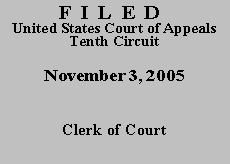

| STATE OF OKLAHOMA, ex rel. The
Board of Regents of the University of
Oklahoma, ex rel. Rogers State
University,
Plaintiff-Appellant, v. JOSHUA STEPHEN FELLMAN, Defendant-Appellee. |
|
On July 14, 2004, RSU filed a civil action against Joshua Stephen Fellman. The complaint alleged that Fellman, a former RSU student and employee, accessed RSU computers without authorization, obtained confidential information, intercepted electronic communications, and interfered with or obstructed computer operations on RSU's computer network. The complaint raised various statutory and common law claims.
RSU filed an Application for Enlargement of Time to Serve Summons and Complaint on November 12, 2004, the last day of the 120-day time period for service set forth in Fed. R. Civ. P. 4(m), asking for a twenty-day good-cause extension. The district court entered a minute order on November 22, 2004, that did not explicitly grant or deny the application. It read, in relevant part: "The Court directs Plaintiff to effect service of process on Defendant forthwith. This Order does not preclude Defendant from moving for dismissal pursuant to Fed. R. Civ. P. 4(m) in the event that Plaintiff's service on Defendant is not proper under the Federal Rules."
On December 3, 2004, Fellman moved to dismiss the action on the ground that service was insufficient. In the motion, Fellman stated that he received a copy of the complaint by mail, return receipt requested, on November 15, 2004, after the expiration of the 120-day limit. The district court granted the motion, stating, "[a]fter a review of the record, the Court finds that proper service was not effectuated within 120 days. Accordingly, pursuant to Fed. R. Civ. P. 12(b)(5), Defendant's Motion . . . is hereby granted. Plaintiff's action is hereby dismissed without prejudice." RSU appeals. We review the district court's dismissal of an action for untimely service of process for abuse of discretion. ARW Exploration Corp. v. Aguirre, 45 F.3d 1455, 1459 (10th Cir. 1995). "A district court that does not exercise its discretion, or makes a decision without providing reasons, abuses that discretion." Id.
Federal Rule of Civil Procedure 4(m) reads, in relevant part:
If service of the summons and complaint is not made upon a defendant within 120 days after the filing of the complaint, the court, upon motion or on its own initiative after notice to the plaintiff, shall dismiss the action without prejudice as to that defendant or direct that service be effected within a specified time; provided that if the plaintiff shows good cause for the failure, the court shall extend the time for service for an appropriate period.
Fed. R. Civ. P. 4(m) (emphasis added). Rule 4(m) makes clear that a district court must extend the time for service if a plaintiff shows good cause. See Espinoza v. United States, 52 F.3d 838, 841 (10th Cir. 1995) (holding that, upon a showing of good cause, Rule 4(m)'s exception is mandatory). Furthermore, "[i]f the plaintiff fails to show good cause, the district court must still consider whether a permissive extension of time may be warranted. At that point the district court may in its discretion either dismiss the case without prejudice or extend the time for service." Id.
The district court's dismissal order does not indicate how the court made the good cause determination, or whether it considered good cause at all. The only finding the court made as a basis for dismissal was that "proper service was not effectuated within 120 days." "Without anything in the record to indicate how the district court made its determination with respect to the good cause exception--assuming it did--appellate review is impossible." ARW Exploration Corp., 45 F.3d at 1459. The court, therefore, abused its discretion in dismissing the case without making the required good-cause determination. It further abused its discretion by failing to consider whether a permissive time extension was warranted. Espinoza, 52 F.3d at 841. We emphasize that this is not a case where the court made an explicit finding that the plaintiff failed to show good cause but declined to elaborate on its reasoning. Rather, the district court made no determination that RSU lacked good cause.(1)
The judgment of the district court is REVERSED and the case is REMANDED for a determination of whether good cause exists for extending the 120-day deadline for service of process or, if no good cause exists, whether a permissive extension of time is warranted. We DENY Fellman's Opposed Request for Judicial Notice in Support of Brief because none of the documents of which Fellman asks us to take judicial notice is necessary to our disposition of this appeal.
Entered for the Court
Circuit Judge
*. The case is unanimously ordered submitted without oral argument pursuant to Fed. R. App. P. 34(a)(2) and 10th Cir. R. 34.1(G). This order and judgment is not binding precedent, except under the doctrines of law of the case, res judicata, and collateral estoppel. The court generally disfavors the citation of orders and judgments; nevertheless, an order and judgment may be cited under the terms and conditions of 10th Cir. R. 36.3.
1. Based on the foregoing disposition, it is unnecessary to consider RSU's alternative argument that dismissal was unjust because the statute of limitations would bar refiling the action. Additionally, we reject RSU's argument that the district court had granted RSU's application for an enlargement of time. The court neither granted nor denied the application. Rather, it directed RSU to "effect service of process on Defendant forthwith" subject to a motion to dismiss if service was "not proper under the Federal Rules."